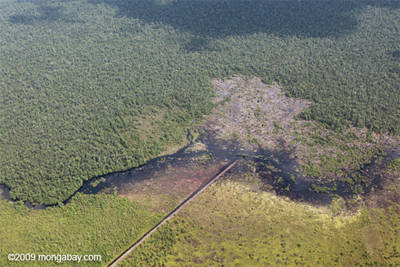Palm oil producers outside of Malaysia and Indonesia pledged to stop developing new plantations on peatlands, circumventing an impasse that developed between palm oil producers and environmental groups meeting this week at the Roundtable on Sustainable Palm Oil in Kuala Lumpur. The factions deadlocked over plans to account for emissions from plantation development, delaying the criteria for a year.
But “Rest of the World” oil palm producer members of the RSPO — including Brazil, Colombia, India, China, and Thailand — broke ranks with producers in Indonesia and Malaysia, saying they would implement a moratorium on new plantings on peatlands. The block cited concerns over greenhouse emissions for the move.
|
|
“As an immediate measure, we will not develop new plantings on peat lands,” said the statement. “This is necessary to reflect the gravity of the situation.”
Non-Indonesian and Malaysian members also said they would be the first members of a proposed voluntary scheme to incorporate greenhouse gas criteria for RSPO members.
“We, as a block, want to be the first participants of the proposed Green House Gas voluntary scheme,” said the statement. “We understand that there will now be another working group to develop criteria regarding Green House Gas emissions. We as the Rest of the World producer members, urge the RSPO to take every measure to ensure a successful outcome of this working group without further delay. A non result from this working group would not be welcomed.”
Palm oil growers in Indonesia and Malaysia, countries which account for 88 percent of global palm oil production, strongly oppose a proposal to limit development to lands that store less than 40 tons of carbon per hectare. They fear such a stipulation would substantially curtail opportunities for expansion, essentially making forests and peatlands off-limits. Growers argue that such rules would not necessarily protect such ecosystems because these lands would still be targeted by non-RSPO members.








